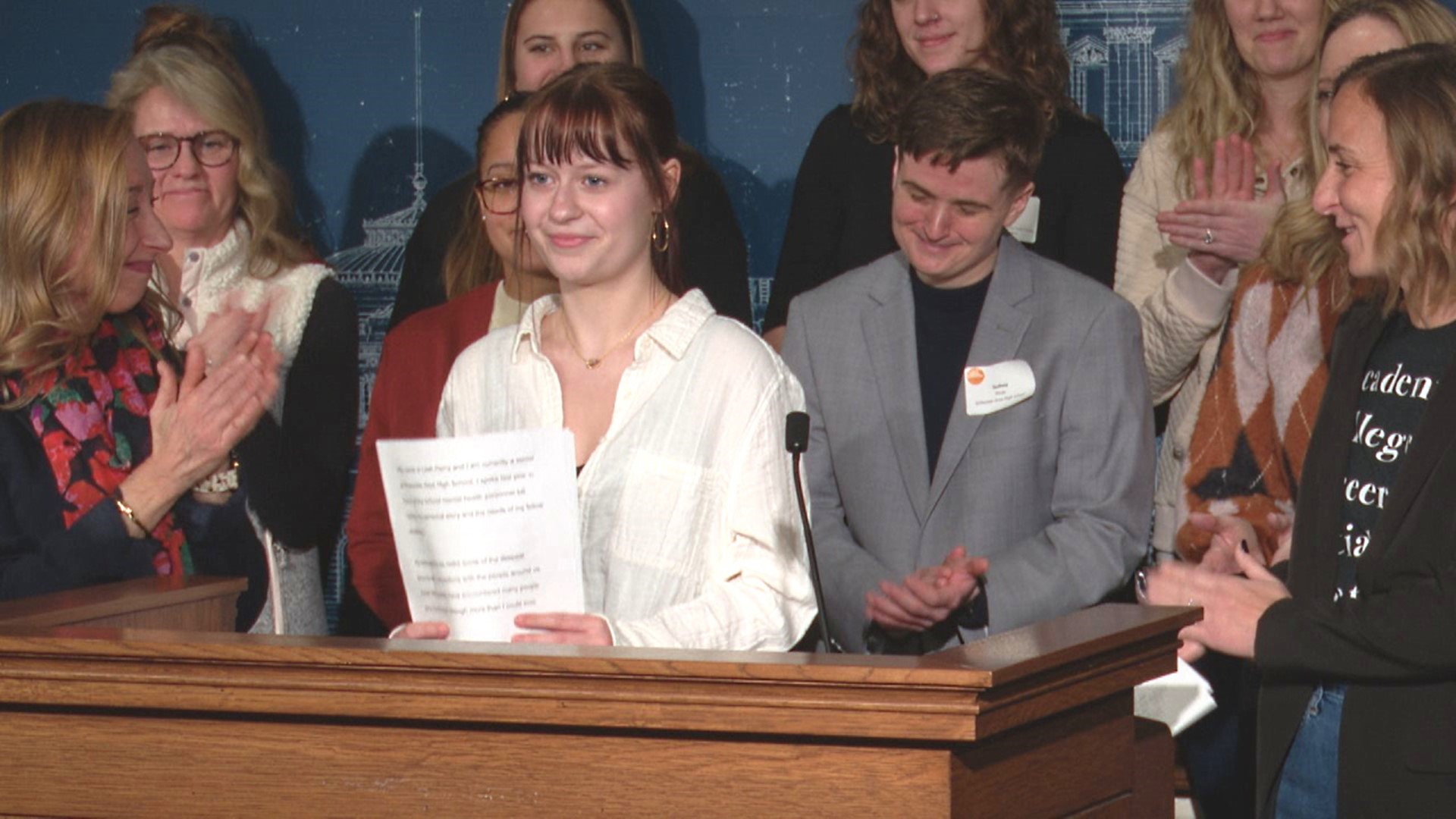ST PAUL, Minn. — Roseville High School senior Lilah Heiny came to the State Capitol complex Thursday to help make the case for more school counselors, specifically a bill that aims for a student-to-counselor ratio of 250 to 1.
That's the ratio recommended by the American School Counselor Association (ASCA) to reach more students and prevent burnout in that profession.
"Especially if you're dealing with mental health things, it's really scary to talk about and it was something I struggled a lot with," Lilah told reporters. "But getting more counselors in the schools and making those ratios a lower level so that students are able to make deeper connections with people is so important!"
Minnesota is a state that prides itself on its commitment to public education and yet ranks near the bottom when it comes to the average number of students per counselor. Minnesota's ratio this year is 533 to one, according to the ASCA. Only Michigan and Arizona are worse off in that category, with rations of 598 and 667 respectively.
Rep. Kaela Berg, a Burnsville Democrat, is carrying a policy bill that recommends the 250:1 student-to-counselor ratio for Minnesota public schools. She told reporters her own experience with her son is one of the things that spurred her to run for office.
"Advocating for my son was almost a second job because there were school counselors that were in three different campuses, two days a week," Rep. Berg remarked.
"He didn't get a full-time counselor until high school, and by then it was too late. And there was a lot of damage done, and a lot of hard work to catch up to where he should've been."
Berg authored legislation in the 2023 Session that applied real money to the problem, with dedicated supplemental funding targeted to school support staff. It equates to $29 million in the fiscal year 2024 plus $35 million in fiscal 2025 to help districts hire counselors, nurses, social workers, psychologists, and chemical dependency counselors.
The legislation also devoted $10 million to the "pipeline," a grant program designed to give college students added incentive to join the profession.
But it will take time to see that new money put into action in a way that narrows the gap, according to Calli Moreau, the president-elect of the Minnesota School Counselor Association.
"That's an amazing amount of money, but it was put in the general education fund, so the way it gets trickled down to our students maybe doesn't have as great as an impact for those who are serving day-to-day as school counselors across the state," Moreau said.
She said some of the money is being used to pay support staff that were previously being paid with grant money that's set to expire. In other cases, Moreau said, new hires are being stretched across multiple campuses.
"Here’s a position where you are going to be a school counselor, but you are going to be at all three levels in our district and you are going to move from building to building in a week," she said. "That position isn’t sustainable. That’s not how a professional works."
Keela Kuhlers, who was named MSCA School Counselor of the Year in 2022, said the need is especially acute in elementary schools. She said that counselors are doing a lot more proactive work in grade schools visiting classrooms to let children know help is available.
"We’re actually out teaching in the classroom. So, I’m hustling my tail each week and I’m in front of 600 students every week doing lessons on identifying the differences between conflict and bullying," Kuhlers told reporters.
"And how to use strategies to recognize growing uncomfortable feelings or strategies to manage that, how to solve conflict with our friends."
Before Lilah and fellow students left the Capitol, they stopped by to visit with Sen. Heather Gustafson of Vadnais Heights to talk about Berg's bill. The ask isn't so much about money, but making sure it's spent where it was intended.
She said students are more apt to ask for help now than they were in the past.
"The biggest thing is making those resources accessible because it can be very difficult to get those appointments scheduled and get ahold of those counselors," Lilah said.
"But most of my friends I’ve spoken to agree it’s becoming more of a normalized thing to reach out and get help when you’re struggling. I personally did it, and it’s something that I’m so glad I did because it’s helped me so much in the long run."
WATCH MORE ON KARE 11+
Download the free KARE 11+ app for Roku, Fire TV, Apple TV and other smart TV platforms to watch more from KARE 11 anytime! The KARE 11+ app includes live streams of all of KARE 11's newscasts. You'll also find on-demand replays of newscasts; the latest from KARE 11 Investigates, Breaking the News and the Land of 10,000 Stories; exclusive programs like Verify and HeartThreads; and Minnesota sports talk from our partners at Locked On Minnesota.
- Add KARE 11+ on Roku here or by searching for KARE 11 in the Roku Channel Store.
- Add KARE 11+ on Fire TV here or by searching for KARE 11 in the Amazon App Store.
- Learn more about the KARE 11+ app for Apple TV in the Apple App Store.
- Learn more about KARE 11+ here.
Watch more local news:
Watch the latest local news from the Twin Cities and across Minnesota in our YouTube playlist:

